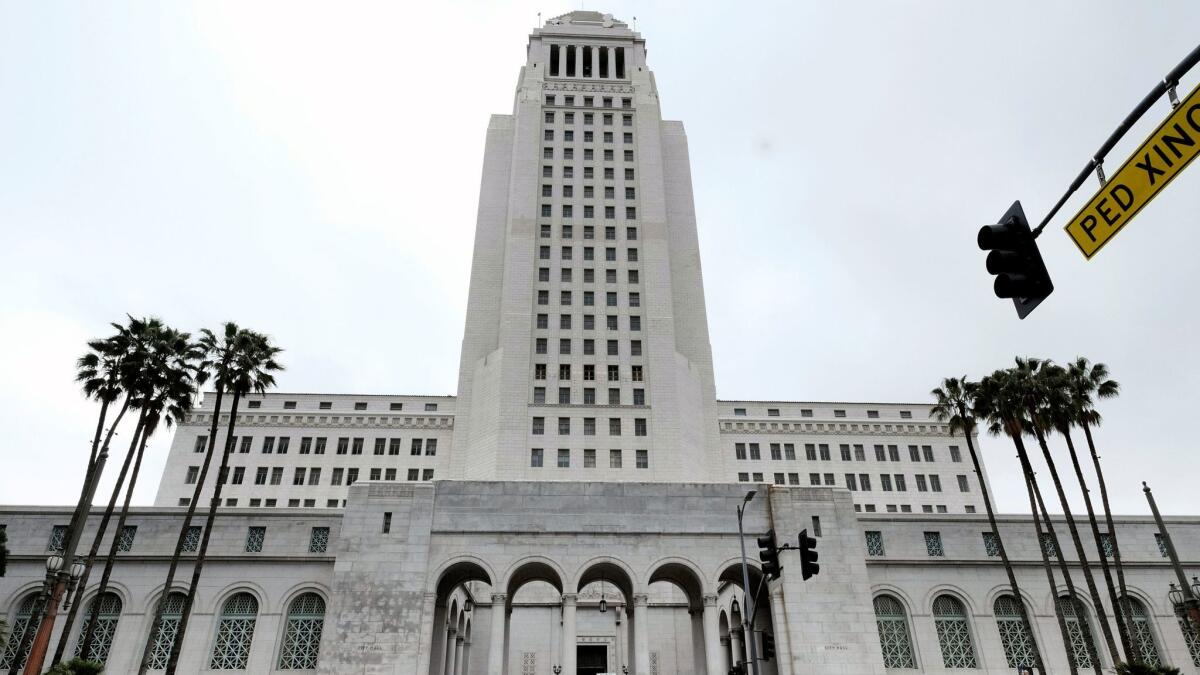A deficit looming for L.A., city departments are asked to find a way to save $100 million

Los Angeles City Hall, facing a potential triple-digit deficit largely tied to recent labor agreements with the city’s police, fire and other unions, could soon implement a sweeping savings plan.
The City Council’s budget committee on Monday voted to support a plan that would order city departments to come up with $100 million this fiscal year.
In a report released last week, the city’s budget chief, Rich Llewellyn, outlined projected deficits of $200 million to $400 million in the coming years, if the city does nothing.
Llewellyn’s report asks city departments to come up with immediate plans to reduce costs or find new revenue sources equal to 3% of what they were given in this year’s budget. The Los Angeles Police Department, for instance, which has a budget that tops $1 billion, would be forced to find $50 million in savings this fiscal year.
Under Llewellyn’s plan, which now heads to the full City Council, city departments must submit proposals for “ongoing expenditure reductions” to position departments to “curtail spending with minimum impact to service levels.” The reductions could come from scaling back hiring, the report states.
“Obviously, a projected deficit of this amount is sobering,” said City Councilman Paul Krekorian, chairman of the Budget and Finance Committee. However, he suggested the expenses from the new labor agreements were anticipated because of the ongoing negotiations with unions. The city doesn’t budget anticipated pay increases into its yearly spending plan, he said.
Maria Gutierrez, a finance specialist with the city’s budget office, told council members that economists are projecting a recession in 2020 or 2021. If growth dips in the 2% to 3% range in the coming years, as expected, “the city’s revenue will be inadequate,” she said.
The city’s predicted deficit also could be exacerbated by additional pending labor agreements, changes to pension liabilities or the cost of major construction projects, she said.
The proposed belt-tightening comes despite current-year budget assumptions of above-average revenue growth of 6.1%, according to Llewellyn’s office.
The city has roughly $419 million available in a special savings fund and some of that can be used for emergencies. Gutierrez told the committee that her office recommends not dipping into the fund to cover the projected deficits.
Employee costs are routinely the biggest driver of city expenses, and this year the city signed off on several agreements that provide year-over-year raises. Pay increases and bonuses that are part of the new three-year contract with the city’s firefighters’ union, for instance, will increase costs by nearly $100 million, according to Llewellyn’s office.
Llewellyn’s savings proposal doesn’t apply to the city’s proprietary departments, which include the Department of Water and Power, the port and airports.
More to Read
Sign up for Essential California
The most important California stories and recommendations in your inbox every morning.
You may occasionally receive promotional content from the Los Angeles Times.











